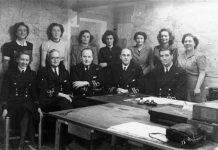Today is Tuesday, April 26, the 117th day of 2016. There are 249 days left in the year.
Highlights in history on this date:
1478 – Guiliano de Medici is killed during Mass at the cathedral in Florence in an unsuccessful coup attempt by the Pazzi family against the Medicis.
1532 – Suleiman I, Sultan of Turkey, invades Hungary and advances toward Vienna.
1607 – Captain John Smith lands at Cape Henry, Virginia, with the first group of colonists to establish a permanent English settlement in America.
1798 – France declares war on Austria.

1807 – Russia and Prussia form alliance to drive France out of German states.
1828 – Russia declares war on Turkey.
1860 – Spain and Morocco sign peace agreement.
1865 – John Wilkes Booth, assassin of U.S. President Abraham Lincoln, is surrounded and killed by troops near Bowling Green, Virginia.
1872 – Civil war breaks out in Spain.
1885 – Britain occupies Port Hamilton, Korea.
1886 – Major powers send ultimatum to Greece to halt support for revolution against Ottomans in Eastern Rumelia, now in Bulgaria.
1937 – In the Spanish civil war, German planes bomb the town of Guernica, killing between 1,000 to 1,650 people. Painter Pablo Picasso later immortalized their suffering in one of his masterpieces.
1945 – Marshal Henri Philippe Petain, the head of France’s Vichy government during World War II, is arrested.
1954 – Member countries of the United Nations meet in Geneva and insist on free elections in Korea.
1962 – First international satellite is launched from Cape Canaveral, Florida — a U.S.-British venture.
1964 – African nations of Tanganyika and Zanzibar merge to form Tanzania.
1966 – Mt. Kelud in Java, Indonesia, erupts, killing 1,000 people. It is the second eruption since 1919, when it claimed 5,000 lives.
1966 – A sidewinder missile, launched by a U.S. jet plane, shoots down the first Communist MIG-21 in the Vietnam War.
1971 – White House commission recommends that China be brought into United Nations, with Nationalist China (Taiwan) retaining its membership.
1986 – The world’s worst nuclear accident occurs at the Chernobyl plant in the Soviet Union when a reactor meltdown in a power plant exposes hundreds of thousands of civilians to dangerous radioactive material. Thirty-two people die immediately.
1989 – Chinese students march to central Beijing to protest government statements condemning their campaign for democracy.
1990 – Leftist Colombian presidential candidate, Carlos Pizarro, is assassinated aboard Colombian airliner. A drug cartel claims and later denies responsibility.
1992 – Moscow residents celebrate first Russian Orthodox Easter in 74 years.
1993 – An Indian airliner hits a truck on takeoff and crashes in Aurangabad, India, killing 56 people.
1994 – Taiwanese airliner crashes in Japan, killing all 264 aboard.
1996 – After 16 days, Israel and Hezbollah guerrillas in Lebanon agree to a truce to end a blitz that had left more than 150 people dead and forced a half-million people to flee.
1997 – Banners of loyalty and life-size images of Saddam Hussein adorn Iraq’s capital, as Iraqis begin seven days of festivities in celebration of his 60th birthday.
1998 – Auxiliary Bishop Juan Gerardi Conedera, a leading human rights activist in Guatemala, is bludgeoned to death two days after a report he compiled on atrocities during Guatemala’s 36-year civil war was made public.
1999 – The Chernobyl computer virus, perhaps the most destructive so far, damages hundreds of thousands of computers around the world.
2000 – Vermont Governor Howard Dean signs the United States’ first bill allowing same-sex couples to form civil unions.
2002 – The U.N. Commission on Human Rights in its annual review of human rights censures Cuba’s human rights policies but drops official condemnations of Russia and Iran.
2003 – Pakistani President General Pervez Musharraf rejects demands from opposition leaders that he give up his role as chief of the military.
2005 – Syria’s last soldier in Lebanon walks across the border, a quiet end to a once indomitable 29-year military presence that was the key to Damascus’ control of its neighbor.
2006 – European Union lawmakers announce findings that the CIA has conducted more than 1,000 clandestine flights in Europe since 2001, and some of them secretly took away terror suspects to countries where they could face torture.
2007 – Thousands of Buddhist monks demonstrate outside the Thailand parliament building to demand that the country’s new constitution enshrine Buddhism as the official national religion.
2008 – Zimbabwe’s electoral commission says a recount of votes for 10 parliamentary seats shows the opposition won six of them in last month’s elections, making it unlikely that Robert Mugabe’s ruling ZANU-PF party can wrest control of parliament.
2009 – World governments race to avoid both a pandemic and global hysteria as more possible swine flu cases surface from New Zealand to Canada and the United States declares a public health emergency.
2010 – Gunmen shoot and kill a Nigerian journalist at his home the same day two others die while attempting to cover fighting between Christians and Muslims in the nation’s restive central highlands, highlighting the daily dangers confronting local journalists in Africa’s most populous nation.
2011 – Syrian forces heap more punishment on residents of restive towns, detaining hundreds in raids or at checkpoints, firing on people trying to retrieve the bodies of anti-government protesters and even shooting holes in rooftop water tanks in a region parched by drought.
2012 – Pakistani authorities deport Osama bin Laden’s three widows and his children to Saudi Arabia, less than a week before the first anniversary of the unilateral American raid that killed the al-Qaida leader in his hideout in a military town.
2013 – Rescuers dig through mangled metal and concrete in a collapsed garment factory building in Bangladesh and find more survivors but also more corpses, pushing the death total past 300.
2014 – South Korea’s prime minister offers to resign over the government’s handling of a deadly ferry sinking, blaming “deep-rooted evils” and societal irregularities for a tragedy that left more than 300 people dead or missing and led to widespread shame, fury and finger-pointing.
2015 – Tens of thousands of Nepalese who spent the night under a chilly sky were jolted awake by strong aftershocks, while rescuers aided by international teams cleared rubble in search of survivors after a powerful earthquake killed nearly 2,000 people.
Today’s Birthdays:
Leonardo da Vinci, Italian painter, engineer, sculptor and architect (1452-1519); David Hume, Scottish philosopher-historian-economist (1711-1776); Alfred Krupp, German metallurgist-industrialist (1812-1887); W.F. Massey, New Zealand politician (1856-1925); Carol Burnett, U.S. actress (1933–); Giancarlo Esposito, U.S. actor (1958–); Joan Chen, Chinese actress (1961–).
Thought for Today:
As a well-spent day brings happy sleep, so life well used brings happy death — Leonardo da Vinci, Italian painter, engineer, sculptor and architect (1452-1519).
Copyright 2016 The Associated Press. All rights reserved. This material may not be published, broadcast, rewritten or redistributed.




